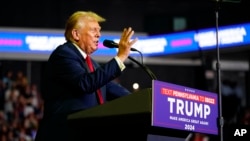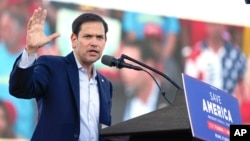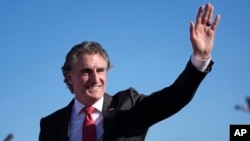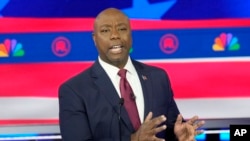Former President Donald Trump has not yet announced the identity of his vice presidential running mate, but media reports and hints from the Trump campaign suggest he could do so between now and the Republican nominating convention in late July.
While Trump could certainly make an unexpected decision, most reports suggest he has narrowed his search to about five potential running mates. The top three include two sitting U.S. senators — Marco Rubio and J.D. Vance — and one sitting governor: Doug Burgum of North Dakota.
Also said to be under consideration are Senator Tim Scott and Representative Elise Stefanik.
The potential nominees would bring different backgrounds and strengths to the Republican presidential ticket. Some had been harshly critical of Trump, only to fall in line after the Republican base coalesced behind him as the party's nominee in the 2016 presidential elections.
The choice is an important one for the Trump campaign, said William A. Galston, a senior fellow at the Brookings Institution.
"The political imperative is the political version of the Hippocratic oath: Do no harm," Galston told VOA. "Because if you pick someone whose flaws come out quickly after the announcement, you will pay a big political price."
Strategic choices
Other strategic choices — beyond ensuring the nominee will not damage the campaign — have helped guide the choice of vice presidential candidates in the past.
Sometimes the pick is used to "heal a breach" between two factions of the president's party. Galston pointed out that the most serious breach in the Republican Party is between Trump supporters and voters who preferred former Governor Nikki Haley in the Republican primary. Trump appears to not have spoken to her after she dropped out, and healing that rift does not appear to be his priority.
Sometimes nominees will select close ideological partners who echo their policy choices. Or they will choose governing partners — steady, experienced leaders who add an aura of competence to the ticket. And some choose running mates who appeal to a portion of the voting public that the nominee might otherwise struggle to reach.
First-generation American
Of the top three candidates, Rubio is the most well known in Washington. An attorney, he has served in government at the municipal, state and national levels for more than 25 years, the last 13 of them in the Senate. He is vice chair of the Senate Intelligence Committee and served as chair when Republicans controlled the Senate.
At 53, Rubio is married and has four children. He is a Miami native and the son of immigrants who came to the United States from Cuba before that country's communist revolution. He is generally hawkish on matters of national security.
As a candidate in the 2016 Republican presidential primary, Rubio was an acerbic critic of Trump, whom he described as a "con artist" and an "embarrassment." He has since become one of the former president's staunchest supporters in Congress.
"Rubio is certainly the best known, and he actually brings more to the table than [Vance and Burgum]," Larry Sabato, director of the University of Virginia Center for Politics, told VOA. "How much he brings, we'll have to see, but he's a Spanish speaker. He is Cuban American. And Latinos have been to some degree slipping away from Democrats."
Effective messenger
Vance is the least experienced in politics, having served in the Senate since January 2023 and having held no elective office prior to that. A native of Ohio, he is 39, married and has three children. He enlisted in the Marine Corps after high school and served in the Iraq War before earning a bachelor's degree and a law degree.
Vance first gained public notice in 2016 when he published his bestselling book, "Hillbilly Elegy: A Memoir of a Family and Culture in Crisis," which analyzed the culture and social pathologies of America's Rust Belt. Vance later became a venture capitalist before running for the Senate in 2022.
Vance was also a harsh critic of Trump in the former president's early years in politics, once describing himself as a "Never Trump" Republican and referring to Trump as "cultural heroin."
Like Rubio, he also became a vocal supporter of Trump after the former president successfully took over the Republican Party.
Galston of Brookings said Vance doesn't bring an obvious electoral benefit to the ticket, as his home state is already very likely to vote for Trump.
However, he said, "Vance would be an effective messenger of the Trump message, although Vance is smart enough that he would commit the occasional mistake of thinking for himself. From time to time there might be some friction, but it wouldn't last."
Quiet competence
Burgum, 67, is a North Dakota native and has served two terms as governor of the state, from late 2016 to the present. He has indicated he will not seek a third. He has three children from his first marriage that ended in 2003. He remarried in 2016.
A wealthy businessman, Burgum has built several successful companies, including an accounting software firm that he sold to Microsoft for more than $1 billion in 2001. He has since been active in many philanthropic endeavors.
Burgum was a candidate for the Republican presidential nomination in 2024 but dropped out of the race in December 2023. Although he was mildly critical of Trump during the campaign, he endorsed the former president early in the election year and went on to be a regular presence on the campaign trail and a media surrogate for him.
"Trump likes him and feels comfortable with him," said Sabato. "He's a business guy, and he's very soft-spoken, has no pizzazz and can't possibly upstage Trump when they're on the stage together."
Other possibilities
While Rubio, Vance and Burgum appear to have the strongest chances right now, Scott and Stefanik are believed to remain under consideration.
Scott, the senator from South Carolina, has been in public office since 1995, when he started his career in local politics. He has been a senator since 2013 and served one term in the House of Representatives before that.
As an African American, Scott might help Trump appeal to Black Americans, a demographic where he has historically underperformed. Trump, however, is already highly favored to win in South Carolina, so choosing Scott would offer him little benefit there.
Stefanik has represented her New York district in the House since 2015 and is chair of the House Republican Conference, a position in the party's leadership. She is an outspoken Trump supporter who came to the former president's attention in part because of her aggressive defense of him when the House of Representatives was considering his first impeachment.
As a woman, Stefanik might help Trump appeal to female voters, with whom the former president has sometimes struggled. As with Scott, however, her selection would be unlikely to affect how her own state votes. New York has not voted for a Republican for president in 40 years, and 61% of its voters backed Joe Biden in 2020, while 38% backed Trump.






